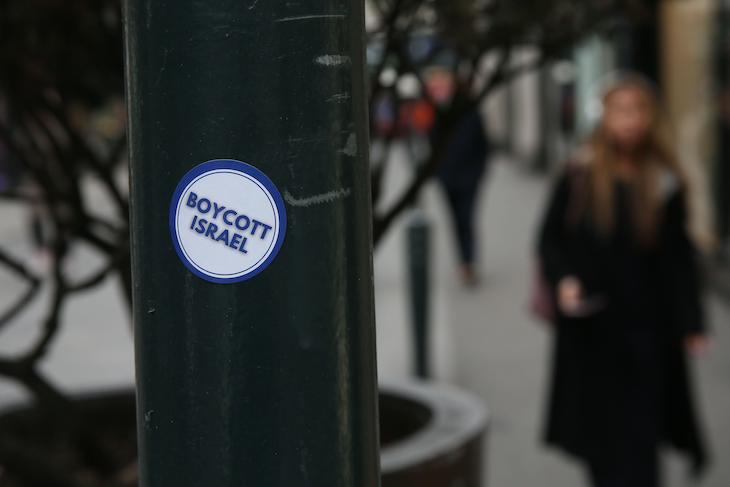It was a quiet lunch shift at the pub in Oxford where I work, the kind of day when the bar feels more like a confessional than a business. A lone customer, a woman with a light accent I took for Dutch, had just finished her meal and approached to pay. Playing the host, I made small talk.
How bad have things become for Israelis here?
“Where are you from?” I asked, expecting the usual tourist’s reply. Her face tightened, her voice dropped to a near-whisper. “Israel,” she said, bracing herself as if I might leap over the bar and chase her out into the street. I reassured her – I support Israel, I said, and I’m ashamed of how Jews are being treated in Britain today. The look of relief on her face was almost comical, tinged with a gratitude that felt, in its own way, deeply sad. Christ, I thought, how bad have things become for Israelis here?
She lingered, and we spoke for the next 20 minutes, the empty pub giving us space to talk freely. She was an academic, here for a conference, her second year attending after a bruising experience in 2024. Last year, she’d been singled out, harassed, made to feel like a pariah – simply for being Israeli.
Determined not to let the “shits” win, she returned this year, though clearly on edge. We found ourselves in easy agreement: the historical illiteracy of Britain’s youth, their obsession with a simplistic oppressor-oppressed narrative, the myth of Israel as a white settler colonial project – all of it ignoring the reality of a nation where the majority of citizens trace their ancestry to the Middle East and North Africa, from the 850,000 Mizrahi Jews expelled after 1948 to the Ethiopian Jews airlifted to safety decades later.
“Why do the Irish hate Israel so much?” she asked suddenly, her question catching me off guard. It was a fair one, and, as I fumbled for an answer, I realised the roots of this hostility run deeper than I’d first thought.
The Irish case is a peculiar one, steeped in history, theology, and a kind of moral posturing that has curdled into something uglier.
Start with the Catholic past. For centuries, the Church peddled the old lie of Jews as “Christ killers,” a venom that lingered in Ireland well into the 20th century. In 1959, Pope John XXIII struck the word “perfidis” – commonly translated as “perfidious” – from the Good Friday prayer for the conversion of Jews, a belated acknowledgement of the damage such language had done.
However, in Ireland, where Catholicism was more than a faith but a cultural bedrock, the stain proved harder to wash out. Figures like Denis Fahey, a theology professor at the Holy Ghost Fathers’ seminary in Dublin, and Edward Cahill, a Jesuit confidant of Éamon de Valera, fanned the flames of anti-Semitism into the 1930s and ’40s. Fahey saw Jews as a threat to Christian civilisation, tying them to communism and Freemasonry in a grand conspiracy against Christ. These weren’t fringe voices; their ideas appeared in respected Catholic journals, like the Irish Catholic. During the Nazi era, Ireland’s government turned a blind eye to Jewish refugees, offering asylum to the wealthy, middle-aged, and Catholic – hardly a lifeline for many of those fleeing the Holocaust.
Ireland hasn’t always been hostile. In 1948, Seán MacBride, Ireland’s minister for external affairs, wrote to his Israeli counterpart, Moshe Sharett, drawing parallels between the two nations: both ancient peoples, both new states born of struggle. Yitzhak Shamir, a future Israeli prime minister, took the nom de guerre “Michael” after the IRA’s Michael Collins, inspired by Ireland’s fight for independence. Once, as Foreign Policy notes, Ireland was a staunch supporter of Jewish aspirations in the Promised Land. What changed?
The shift came with Ireland’s own historical lens. By the mid-20th century, the Irish – especially republicans – began to see the Arab-Israeli conflict as a mirror of their own struggle against British rule. A 1945 piece in Dublin’s the Bell magazine cast Palestinians as the virtuous Irish, suffering under British “terrorists,” with Israelis doomed to play the role of the occupying British.
By the 1980s, Belfast murals in nationalist areas showed IRA and PLO fighters united under the slogan “IRA-PLO one struggle.” Sinn Féin, the IRA’s political wing, remains a vocal critic of Israel, its rhetoric often veering into anti-Semitic territory.
In recent years, Ireland has seen growing support for the BDS (Boycott, Divestment and Sanctions) movement against Israel, exemplified by parliamentary debates and the advancement of measures like the Control of Economic Activity (Occupied Territories) Bill 2018, which targets trade with Israeli settlements. Some observers have noted vituperative anti-Israel rhetoric in these discussions, including a legislator’s invocation of ‘Jewish supremacy’. This isn’t a grassroots phenomenon but a top-down one, driven by Ireland’s political and academic elites aided, as Mosaic Magazine notes, by activist groups amplifying anti-Israel sentiment on campuses.
The modern Irish left, steeped in a simplistic oppressor-oppressed binary, finds this narrative irresistible. It ignores the reality of Israel’s diverse population – Mizrahi, Ethiopian, and Ashkenazi Jews alike – and casts the nation as a European colonial implant, a myth that erases the Middle Eastern roots of most Israelis.
My guest shook her head as she spoke of the pro-Palestinian activism she’d encountered at universities, the way it framed Israel as a white settler state. “It’s a lie,” she said, “but it fits their story.”
There’s a deeper tragedy here, one that extends beyond Ireland to Britain itself. My guest’s whispered admission of her nationality, her braced posture as she awaited rejection, speaks to a broader failure. Oxford, a city that prides itself on enlightenment, should be a place where an Israeli academic can speak freely, not one where she fears ostracism. Ireland’s hostility – rooted in historical resentment, theological baggage, and modern activism – sets a dangerous precedent. We’ve seen where this leads: Dublin’s indifference in the 1930s, Belfast’s murals in the 1980s, the parliamentary rants of 2024. Britain, too, risks losing its way if it allows such attitudes to fester unchecked.
As she left, my guest thanked me, her smile a mix of relief and cautious hope. “You’ve made my day,” she said. I smiled back, but inside, I felt a quiet unease. How many others like her are out there, whispering their identities, bracing for the worst?
Britain and Ireland once stood for something greater – free speech, historical truth, the right to exist without fear. We must not forget those values now, lest we wake one day to find them gone, replaced by the shadows of old hatreds we thought we’d left behind.







Comments